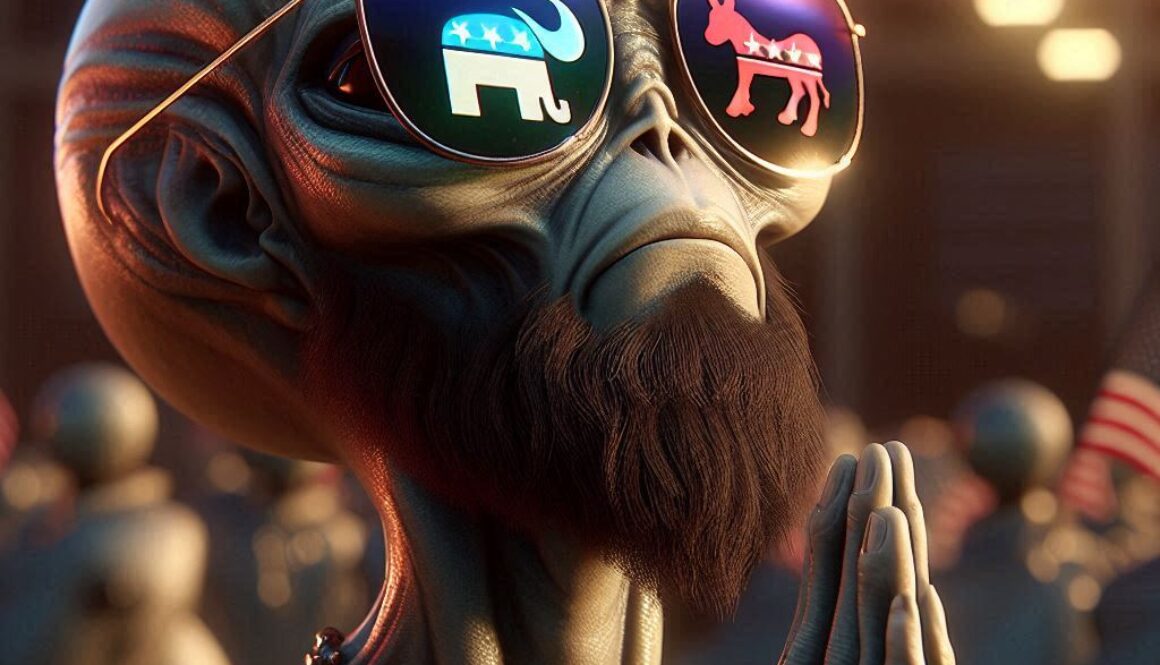Political Discourse and the Quest for Unity
No matter your efforts to remain insulated or detached from current events, it is nearly impossible to completely ignore the political reverberations emanating from the most influential nation on your planet. Donald J. Trump has ascended once more to the presidency as the 47th leader of the United States, sending shockwaves through his opposition. His persona is undeniably brash, and his flaws well-documented. Yet, as I noted in prior musings, your world’s choices for leadership often lack the refinement and vision that would truly reflect your potential or measure up against beings of far-reaching intellect, such as myself, should we make our presence known.
The notion that politicians are servants of the people, representatives of collective interests, is more illusion than reality. Too often, they serve primarily their own ambitions and the narrow circles of influence around them. This truth, though slowly surfacing, is increasingly recognized, as the murmurs of discontent grow louder and the people insist upon being heard. And may I add that for a political faction that purports to champion the working class—the backbone and largest segment of your populace—it is puzzling and deeply ironic how frequently their actions seem tailored to the whims of the powerful elite. This dissonance is neither subtle nor isolated; it permeates their policy priorities and political gestures.
But what I find most fascinating—and troubling—is the spectacle of political discourse in your society. Consider the tactics employed by rival factions to sway one another. A cursory glance at social media will reveal a battleground where insults and mockery replace thoughtful debate. Each side seeks to convince by undermining the other’s dignity, labeling opponents as ignorant, uninformed, or inherently inferior for their choices. Such tactics do little to persuade; instead, they serve to entrench beliefs, deepen divides, and amplify discord. In truth, a more constructive approach is needed—one rooted in empathy, dialogue, and the recognition that no single ideology holds all the answers.
To move beyond divisiveness and to truly serve humanity’s diverse interests, there must be a willingness to engage thoughtfully and respectfully with opposing views. Constructive dialogue, however, seems to be in increasingly short supply. The polarization of political and social thought, facilitated by echo chambers that reinforce biases, drives an ever-widening gulf between factions. When people are bombarded with messages that validate their existing beliefs and demonize alternative perspectives, the possibility of meaningful compromise or collective progress becomes a distant hope.
Your social media platforms, though extraordinary in their capacity to connect millions instantaneously, often devolve into arenas for grandstanding, shaming, and confrontation. A space intended for the free exchange of ideas has, in many respects, become a breeding ground for factionalism and distrust. The desire to “win” arguments or humiliate opponents frequently eclipses the more noble goals of understanding and mutual respect. What good can come of a debate in which neither side listens, and each merely waits for their turn to speak? This cycle of hostility creates a dangerous inertia, wherein true dialogue becomes unattainable, and complex issues are reduced to crude simplifications.
At its heart, the democratic process should strive to reflect the diversity of human experience and aspiration. Political representation ought to be a mirror of the collective will, with elected officials acting as stewards of their constituents’ hopes and fears. Sadly, what I observe is often more cynical—a competition not to elevate the human spirit, but to accumulate power and maintain influence. Many leaders, caught in a perpetual cycle of campaigning, seem more invested in optics than outcomes. While there are undoubtedly politicians driven by genuine conviction and integrity, they are frequently drowned out by those who prioritize self-interest or bend to the pressures of lobbyists and special interests.
The result is stagnation. Political gridlock, driven by intransigence and self-preservation, leaves vital issues unaddressed. From economic inequality and healthcare reform to climate change and social justice, the weight of these challenges grows heavier by the day. Yet, those entrusted to govern often prioritize partisan battles over collaborative solutions. The failure to find common ground not only weakens institutions but erodes public trust. Citizens, feeling alienated and unheard, withdraw their engagement or channel their frustration into movements that seek to upend established norms. This dynamic, while a testament to human resilience and creativity, is also a sobering reminder of what can happen when people no longer believe their voices matter within traditional systems.
There is a profound irony in the way political factions claim to be champions of democracy while undermining its core tenets through their behavior. The sanctity of democratic norms—respect for the rule of law, adherence to fair electoral processes, and the protection of civil liberties—should be the foundation upon which all parties stand. Yet, when political leaders use incendiary rhetoric, peddle conspiracies, or manipulate the levers of power to serve their ends, they undermine democracy itself. This erosion is insidious, not always immediate, but its impact is felt deeply over time, as cynicism and disillusionment take root in the populace.
How, then, might humanity find a way forward? If I, as a visitor from another world, were to offer any guidance, it would be to cultivate humility in political discourse. No one person, party, or ideology holds a monopoly on truth. The willingness to listen—to truly listen—to those with whom one disagrees is a skill too often neglected. The ability to admit when one is wrong, to compromise for the greater good, or to recognize that complex problems demand nuanced solutions, is essential for progress. A political culture built on collaboration rather than confrontation may seem utopian, but it is not beyond your reach.
Moreover, the public must reclaim its power as engaged citizens. This requires not only holding leaders accountable through elections but also demanding transparency, integrity, and meaningful action. Grassroots movements have demonstrated the power of collective advocacy and the importance of mobilizing beyond mere partisanship. Civil society has the capacity to drive change from the ground up, forcing political leaders to adapt or risk irrelevance.
Education plays a critical role in this transformation. An informed electorate is the bedrock of a healthy democracy. It is imperative to teach critical thinking, media literacy, and empathy—skills that empower individuals to sift through propaganda and recognize when their emotions are being manipulated. As misinformation proliferates and algorithms amplify outrage, these skills are more vital than ever. If citizens can distinguish fact from fiction, engage with diverse perspectives, and question the motives behind political narratives, they will be better equipped to challenge demagoguery and demand substantive solutions.
Ultimately, your species’ survival and success will not be determined by individual leaders, no matter how controversial or celebrated. It will be shaped by your collective resolve to foster justice, equity, and understanding. True progress is made when people rise above the petty squabbles of the moment to pursue a vision of the future grounded in shared humanity. Leaders may come and go, but the strength of your institutions, the vibrancy of your civil society, and the resilience of your spirit will endure. In this, there lies hope—a hope I find inspiring and worthy of admiration, even from an observer beyond the stars.
Yours in Peace and Love,
P.a.L.


